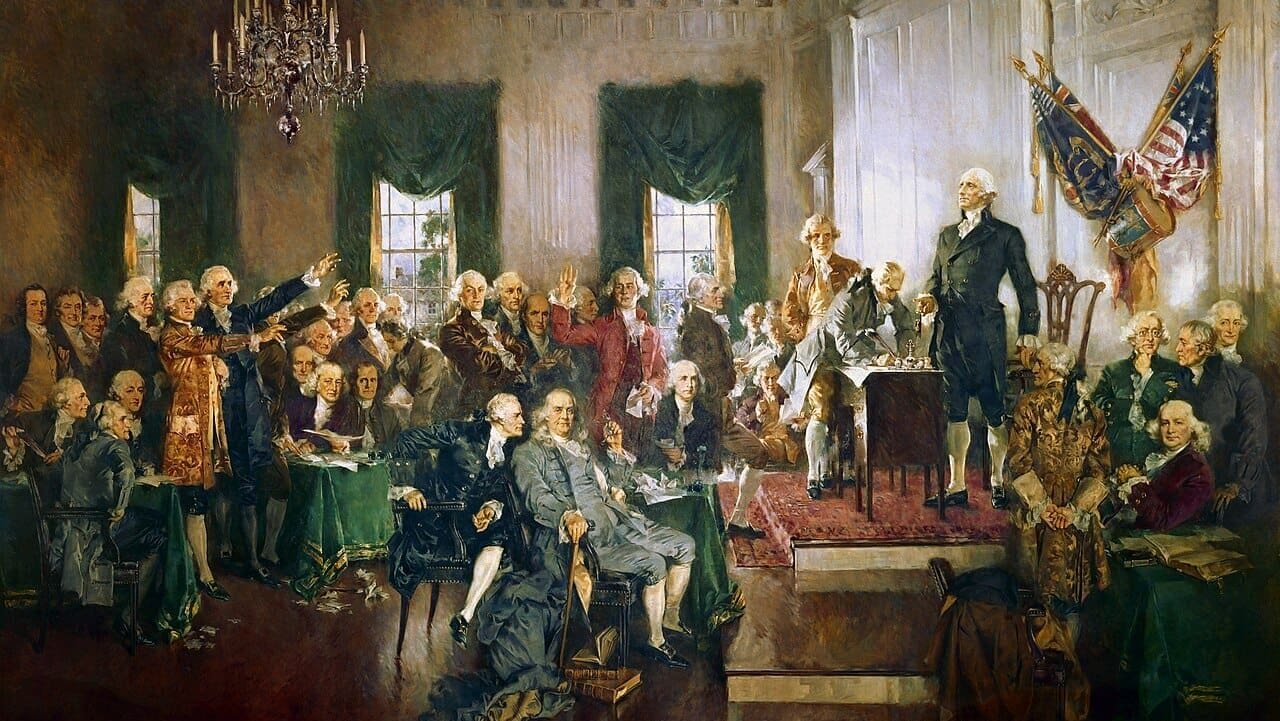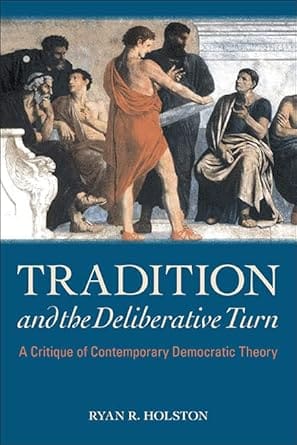
Scene at the Signing of the Constitution of the United States (1940), a 609.6 cm x 914.4 cm oil on canvas by Howard Chandler Christy (1873-1952), located at the United States Capitol

Who would have thought that without the support of tradition, democratic institutions would face fundamental problems? This is the danger highlighted by Ryan R. Holston, a professor at the Virginia Military Institute in Tradition and the Deliberative Turn: A Critique of Contemporary Democratic Theory.
“Deliberative turn” is the term used to describe a trend in democratic theory that became dominant in the literature of the 1980s and ’90s. The claim of this political science movement was that it is not merely the observance of procedural rules that makes a given political power legitimate. Decisions must be the result of a decision-making process in which everyone contributes to the debate and can express their arguments freely. Hence, it is assured that the decision is taken on the basis of the argument that is most convincing to most people, following rational debate. John Rawls, on one side of the ocean, and Jürgen Habermas, on the other, became the iconic figures of the theory of operating democracy through rational debate.
On the face of it, the general account offered by these theorists seems very convincing, because if humans are rational, why would we not base decision-making processes on rational debate? Fair and equal debate obviously helps to avoid mistakes and helps to find the good solutions. Holston, however, in his recently published book, raises serious doubts, or at least posits very important conditions, concerning the viability of the deliberative model.
Of course, in order to align his book Tradition and the Deliberative Turn (2023) with his own original question, the author must also reinterpret the decision-making turn to some extent. He traces the theory back to Aristotle’s Politics and Nicomachean Ethics. This leads us directly to the insight that decision-making is not a mere discursive logical deduction, but a practice that we acquire by participating in established forms of procedures of life in community.
Our author could arrive at this insight following a Wittgensteinian logic, but he prefers to rely on Gadamer’s theory, which he considers Neo-Aristotelian. He is particularly interested in Gadamer’s practical philosophy which lies below his hermeneutic theory. Gadamer combined Aristotle’s concept of ethos with Hegel’s category of Sittlichkeit in order to deny the Enlightenment distinction between right and good on the one hand, and historical effect and existential fact on the other. In short, he rejected the divorcing of the moral from the historical. The point is this: in order to ascribe meaning to the idea of an assembly of intelligently deliberating citizens, we must first be aware of the specific historical process that led to the birth and explained the functioning of that particular assembly.
However, the Enlightenment philosophical movement that provides the basis for the idea of deliberative democracy runs counter to this requirement. On the one hand, you find Rousseau’s notion of the social contract and, on the other, Kant’s taxonomy. Both thinkers separate the moral from the historical and subordinate it to the permanent and unlimited freedom of the individual. It is on this atomistic-individualistic anthropology that both Rawls and Habermas built their ethical account, and it is therefore not a problem for them that in a globalising, multicultural society the traditional communities that previously transmitted the appropriation of meaning from generation to generation are in constant and ever growing danger of vanishing.
No wonder that Gadamer’s own philosophy is based on a critique of Enlightened rationalism. His aim is to reconcile the conceptual juxtapositions of such sharp contrasts as subjectivity and objectivity, sollen and sein, feeling and rationality, authority and reason, rhetoric and rationality. He is interested in the real human experience, the encounter with which is a prerequisite for real understanding. And the content of experience can never be directly universalized or separated from everyday practices. The task of understanding on a historical scale is to overcome the historical distance. This aim requires crossing the dividing line between morality and historicity. Which in turn leads Gadamer to the rehabilitation of authority and tradition. For these concepts were obviously negatively perceived in Enlightenment thought, but without them human communities cannot become a true community of experience (sensus communis).
In contrast to the abstract Kantian idea of the good, the Aristotelian key to the good choice is phronesis, or practical wisdom, which is a virtue and thus a function of the way of life (once again, see the Hegelian notion of Sittlichkeit as a precondition for Gadamer’s idea). The moral choice is thus not the conclusion of a simple a priori deduction, but an answer to the question who we are, or what kind of person or character we have become. It all depends on what we are like as living, historically embedded persons. Understanding is a function of our historical sense: our experiences can be traced back through generations, and mobilising them presupposes anamnesis—that is, the making present again to ourselves the experience of the ages.
This is where sensus communis as a common practical wisdom becomes important, as well as prejudice (Vorurteile), which makes available to us the practical wisdom crystallised in the experiences of our ancestors. It is by drawing on prejudice that we can make tradition the basis of habit for ourselves. In our own sense-making we can affirm, embrace, and cultivate tradition. It is through mobilising tradition through prejudice that we can collectively delineate the actual common good that is the very purpose of political decision-making.
Here comes the point where Holston observes his own contemporary culture in America. With surprising resignation, he has to conclude that there are periods—and that of contemporary American politics is one of them—when “we don’t really ‘hear’ each other.” This is true of much of the Western world today, insofar as the culture war sharply divides its societies. And it is also true of Hungary, which has become divided, albeit in a different way, both as a victim of politics and as a result of its own political elites’ and citizens’ decisions.
As regards the structure of the book, the first two chapters present the respective and interrelated ideas of Rousseau and Kant on the autonomous, individual use of reason. In the third, it turns to contemporary deliberative theories, analysing the trend marked especially by such thinkers as Rawls and Habermas. In the fourth chapter, a reconstruction of the Gadamerian conception of tradition is given, followed in the fifth chapter by an application of this to the question of deliberative theories. Finally, the last chapter opens up the perspective further, raising more general questions of philosophical anthropology and drawing attention to the communal embeddedness of individual freedom, linking the Aristotelian tradition to pressing questions in modernity.
Overall, the volume presents a case in defence of the relevance of practical wisdom, communal practices, and traditions in politics, and raises questions that can help to uncover historical links between liberal and conservative self-understandings, and in this way can encourage both sides to maintain a capacity for dialogue, competing for the sympathy of the reader.